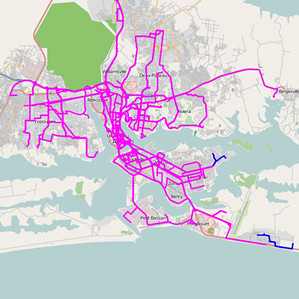Researchers at IBM, using movement data collected from millions of mobile phone users in Ivory Coast in West Africa, have developed a new model for optimising an urban transportation system. The IBM model prescribed changes in bus routes around the around Abidjan, the nation’s largest city. These changes based on people’s movements via mobile phone records could, in theory, slash travel times by 10 percent.

Mobility data
Mobility data is created when someone uses a phone for a call or text message. That action is registered on a mobile phone tower and serves as a report on the user’s general location somewhere within the tower’s radius.
Mobile phone data promises to be a boon for many industries. Other research groups are using similar data sets to develop credit histories based on a person’s movements and phone-based transactions, to detect emerging ethnic conflicts, and to predict where people will go after a natural disaster to better serve them when one strikes.
To do such tasks in the developing world, there may be little or no other data to work with. Owners of smartphones that have GPS can allow apps like Google Maps to use their location data for traffic sensing information shared with others. But location information on the simple phones that are far more prevalent in the developing world is known only to the mobile carriers. And that data is available only by special arrangement with the carriers.
High costs of traditional research in developing markets
In the case of transportation, improving roads and public transit systems often depends on labour-intensive work such as the traveller surveys done commonly in the rich world. “The cost of traditional surveys is very high for developing world applications, but mobile phone use is high, so mobile traces are a terrific data opportunity. This is a valuable investigative effort,” says Kara Kockelman, a transportation researcher at the University of Texas, Austin.
Find out more about mobile research
Read the full article
